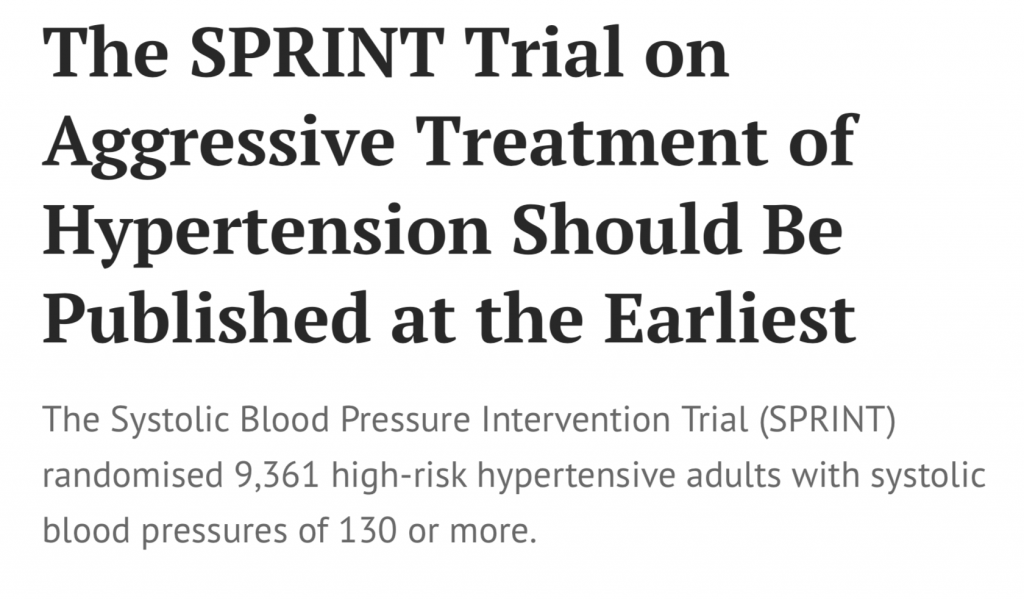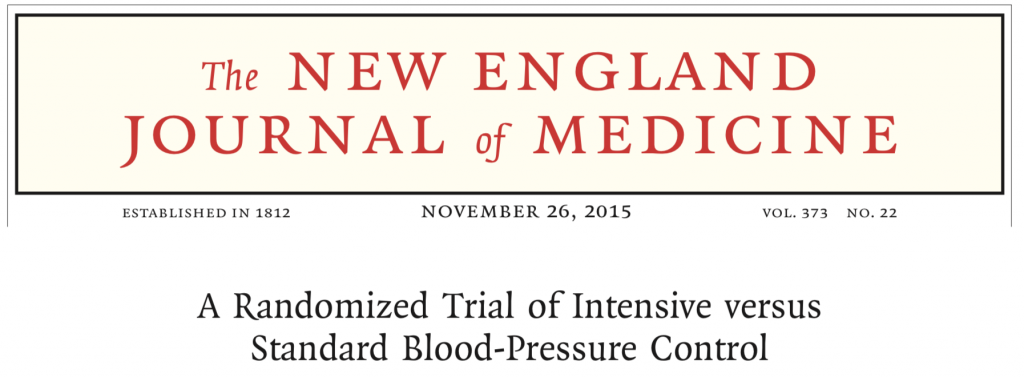A video clip distributed recently in a Whatsapp group of doctors featured a senior cardiac surgeon promulgating to a group of bored and confused journalists that good doctors have magic in their hands. Now that certainly may be true for surgeons but not for the entire profession. No one will argue that equally (if not far more importantly) is the quality of the mind that a good doctor carries. A decent professional needs above all a mind that can recall, crunch numbers, analyse signs and symptoms and to take decisive action in the form of intervention or medical treatment. The scriptures too concede that above the senses is the brain, upon the brain is the mind, which in turn is regulated by the consciousness. Emphasising the vital importance of both brain and mind. Let us for the time being stick to the mind, especially with news that the SPRINT-MIND study was presented in the annual meeting of international Alzheimer’s Association last Wednesday.
Almost 3 years ago I had expressed my concern that the SPRINT trial on hypertension generated wide spread publicity in the lay media even before publication in a peer reviewed journal. Every American newspaper and TV channel was bubbling with excitement about the news that intensive lowering of blood pressure to 120 mm Hg systolic would cut down death, heart attack, stroke, acute coronary syndrome, and heart failure significantly. The details of the data were however were largely unknown. The spin was on relative reduction but the actual numbers of events were not provided.

Before the SPRINT trial the aim had been to lower blood pressure to 150 or less in people above 60 years , and 140 or less in those below 60 years. The SPRINT trial was eventually published in the New England Journal of Medicine. The data was before us now. The Systolic Blood Pressure Intervention Trial (SPRINT) randomised 9361 high risk hypertensive adults with systolic blood pressure greater than 130 mm Hg. Participants had to be more than 50 years with one risk factor; known cardiovascular disease, age greater than 75 years, chronic kidney disease or having a CVD risk of 15% or more over 10 years. There were loud headlines in news papers (before the paper was actually published ) that intensive blood pressure treatment reduced risk of death by 25%, and risk of heart failure, heart attack and stroke by 33%. The numbers were impressive. Relative reduction in events however invariably exaggerate clinical efficacy, while concealing actual gains if any. This to my mind was the case with the SPRINT trial too. On examining absolute changes in the published paper (in the New England Journal of Medicine) it was obvious that heart attack was reduced by a mere 0.4%, unstable angina was not reduced at all, stroke was lowered by 0.2 % while cardiovascular mortality was reduced by only 0.6% (reduction in absolute terms with intensive versus standard treatment) On the other hand adverse effects were substantial. Hypotension increased by 70%, syncope by 40% and acute kidney injury was raised by 70% in the treated group. It should be noted that patients who had blood pressure at base line more than 160 m Hg had greater mortality when their blood pressure was lowered below 120 mm Hg.
The most recent hypertension guidelines mandate that blood pressure above 130/80 mm Hg be treated. It is no surprise that the lead authors of the SPRINT trial carry prominent positions in the committee that has proposed the latest hypertension guidelines.
The latest bout of media frenzy involves the presentation of the SPRINT MIND trial data by the National Institute of Health in the Alzheimers Association International Conference (AAIC) suggesting that aggressive blood pressure control protects the brain. The official press release by the Alzheimer’s association reads ‘Study Shows Intensive Blood Pressure Control Reduced Risk of Mild Cognitive Impairment (MCI) and the Combined Risk of MCI and Dementia.’ The press release also informed that the results were “preliminary” and as yet not published in a peer reviewed journal.
The incident of mild cognitive impairment (MCI) was lowered by relative 19%; p=0.01, combined outcome of MCI and probably dementia lowered by relative 15% ; p=0.02) in the intensive versus standard treatment group. This is all very fine as we read it, but probable dementia was not reduced significantly ( HR=0.83, CI: 0.67 to 1.04). Undoubtedly MCI matters clinically, but dementia is of much greater concern. The follow up of these patients for more than 3 years is understandably short, and a longer follow up may have shown more robust results. But he relative reduction figures like in the parent trial may turn out to be of little clinical impact value.
Probable dementia occurred in 147/4678 (3.14%) in intensive treated group versus 175/4683 (3.74%) ; absolute reduction of only 0.6%. Minor cognition impairment was seen in 285/4678 (6.09 %) vs. 348/4683 (7.43%); absolute reduction of 1.3% only.
Only 673 participants could be short listed for MRI evaluation. Note that more than 9,300 participants were recruited for the SPRINT trial. Follow up MRI’s were available for 454 participants. On MRI white matter lesion (WML) increased by 0.28 cm3 in intensive treatment group as opposed to 0.92 cm3 in standard treatment group . Total brain volume decreased by 27 cm3 in intensive treatment group vs. 25 cm3 in the standard treatment group (NS). White master lessons indicate small vessel disease and are linked to stroke, dementia and mortality. But it remains to be confirmed whether the minuscule decrease in white matter lesion volume by aggressive hypertension treatment makes any clinical difference. The number of patients studied are too few, only 454 people from a total population of 9361 (less than 5%).
Dementia is a serious problem, and ever growing. Alzheimer’s is suspected to be caused by protein deposition in the brain, that as yet is without proven treatment. Even a few years of diabetes is well known to seriously impair cognition. With growing age man tends to weaken both physically and mentally. Loss of muscle mass is not compensated by heightened brain activity.The scripture have nothing to say about an ageing consciousness or an ageing mind. It is presumed in the scriptures that despite the brain being ravaged by microscopic infarcts and white matter dissolution , the mind remains unaffected. In clinical practice however we have nothing to go by for evaluating human consciousness as described in the scriptures.
It is imperative that we come up with treatment modallities to prevent and treat dementia because dementia has become ubiquitous. Maybe tight control of blood pressure prevents microscopic vascular infarcts or protects the gray matter in some hidden way. The SPRINT MIND trial, however fails to provide robust data that supports intensive blood pressure control by medicines protects the mind. The same blood pressure lowering effects could be easily achieved by a good diet and a little exercise.
The SPRINT MIND trial publicity is yet to trickle down to the Indian media. When it does, It shall most certainly draw the attention of the public to the importance of the human brain and mind. The mind as you know is more important than the brain. More studies are needed to assess the effects of aggressive hypertension treatment on the brain. But there is near unanimity amongst scientists that hypertension, along with diabetes , may substantially impair ones ability to judge or make decisions. It may therefore be worthwhile to note the prevalence of hypertension and diabetes in potential candidates vying for the Lok Sabha in the coming general elections. No wonder Donald Trump ensured his personal physician clearly state that his blood pressure was 110/70 mm Hg before the presidential elections.
The SPRINT TIME trial by recording no significant difference in the risk of dementia by intensive hypertension treatment does not justify the current media blitz. We must wait for more randomised trials to replicate the results of SPRINT MIND before scrambling to revise guidelines.


